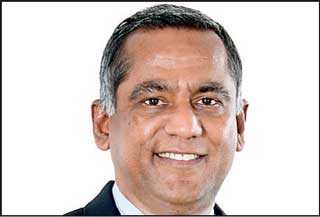Thursday Feb 26, 2026
Thursday Feb 26, 2026
Friday, 13 November 2020 00:12 - - {{hitsCtrl.values.hits}}
 |
| Chairman Harsha Amarasekera |
 |
| Managing Director Nanda Fernando
|
Despite the drastic economic downturn, Sampath Bank said it has recorded a profit before tax (PBT) of Rs. 6.99 billion and a profit after tax (PAT) of Rs. 5.09 billion for the nine months ended 30 September 2020, reflecting a decline of 33.1% and 22% respectively from a year earlier.
The Bank recorded PBT of Rs. 1.66 b and a PAT of Rs. 1.12 b during the third quarter from 1 July 2020 to 30 September 2020, a drop of 64.2% and 53.8% respectively compared to Q3 of 2019.
PBT and PAT of the Group for the first nine months of the year stood at Rs. 7.31 b and Rs. 5.21 b respectively. This is a reduction of 32.6% in PBT and 23% in PAT against the achievements of the corresponding period.
In a statement Sampath Bank said the spread of the COVID-19 pandemic and related containment measures have resulted in a significant downturn in the global and local economies. The Central Bank of Sri Lanka continued to implement monetary easing measures including, several policy rates cut in a bid to stimulate an economic recovery.
These measures, together with relief measures granted to customers under the moratorium schemes by charging lower interest rates below the market rates significantly affected the Bank’s Net Interest Income (NII) in the nine months ended 30th September 2020. Sampath Bank’s NII declined by 15.5% to Rs. 25.99 b for the first nine months of the year compared to the same period in 2019.
Overall, interest income for the period under review decreased by Rs. 9.67 b in the first nine months of 2020 to Rs. 68.02 b, reflecting a decline of 12.4% compared to Rs. 77.7 b recorded in the corresponding period in 2019.
Interest expenses for the nine months ended 30th September 2020 also decreased to Rs. 42.02 b compared to Rs. 46.91 b recorded in 2019, denoting a decline of 10.40%.
Consequently, the Net Interest Margin for the period under review decreased to 3.46% compared to 4.46% reported in 2019.
Net fee and commission income, which mainly comprises credit, trade, card and electronic channel related fees, was Rs. 5.99 b for the period under review, a decline of 18% over the figure reported for the corresponding period in 2019. Low credit demand due to the economic downturn significantly affected the credit related fee income.
Further, the low usage of credit cards due to the pandemic situation affected the credit card related commission income. Meanwhile, fee and commission income from digital products reported a substantial growth compared to the corresponding period in 2019 driven by higher usage of the Bank’s digital products during the lockdown period and thereafter. Trade related commission income too reported a marginal growth due to increased acceptances and documentary credit volumes.
Net other operating income recorded a significant YoY increase of 197.5% during the nine months ended 30 September 2020 to Rs. 3.10 b, from Rs. 1.04 b reported for the corresponding period in 2019. This was due to a sizeable increase in exchange income owing to the 2% depreciation of the Sri Lankan Rupee against the US Dollar.
Due to the currency depreciation, the Bank also incurred a net trading loss of Rs. 523 m as mark to market losses on forward exchange contracts. Therefore, the Bank’s net exchange income from foreign exchange transactions amounted to Rs. 2.15 b for the period under review compared to Rs. 2.24 b reported during the corresponding period in 2019.
The statement said due to the dedication and the commitment the Sampath team has shown in this incredibly tough time, the Bank ensures that they are appropriately rewarded. Accordingly, personnel expenses increased marginally by 2.6%.
In addition to the cost control strategies already implemented by the management, a few new enhanced cost control plans were also introduced during this quarter. These cost-containment strategies helped to minimise the impact on the bottom line caused by a weaker revenue environment. As a result, overall operating expenses decreased by 3% against the comparative period.
Meanwhile, the Bank’s Cost-to-Income ratio (excluding taxes on financial services) increased to 42.3% during the period under review, from 37.5% reported in the corresponding period in 2019. The main reason for this increase was the drop in the main sources of income.
The total investments in foreign currency denominated Government securities as at 30 September 2020 amounted to Rs. 87 b (31 December 2019: Rs. 67 b). During the first nine months of 2020, the Bank made a total provision of Rs. 950 m against FCY bonds, a 741% increase compared to the 2019 provision of Rs. 113 m. Out of the above provision Rs. 704 m was recognised against sovereign rating downgrading and in 2019 none was reported.
The Bank typically uses the Fitch rating to determine the probability of default on foreign currency denominated government bonds. Fitch downgraded the sovereign rating in April 2020 and accordingly a provision of Rs. 316 m was recognised in 2Q 2020.
Further, Moody’s Investor Services downgraded the sovereign rating in September 2020 by two notches to Caa1, which is one notch below Fitch’s current rating. Consequently, the Bank decided to use a more conservative approach and charged an additional impairment provision on the above instruments during the quarter in anticipation of a probable downgrading by Fitch.
Sampath Bank said even though it is difficult to reliably estimate the adverse impact on our customer base due to COVID-19, based on the available information the Bank took steps to make additional provisions against the customers showing distress signs.
Further, customers operating in vulnerable/risk elevated industries such as tourism, apparel, vehicle import, overseas lending, transportation and condominium constructions were pushed to the stage 2 category. This required the Bank to absorb an additional charge under collective impairment in the third quarter. We have also increased the collective impairment charge by adjusting the probability weightage applied for different economic scenarios since a proper economic forecast is not available.
Sampath Bank’s total asset base grew by 10.9% (annualised 14.6%) during the period under review and stood at Rs. 1.1 t as at 30 September 2020. In comparison, the total asset position as at 31st December 2019 stood at Rs. 962 b. Gross loans and advances grew by 4.6% (annualised 6.2%) to reach Rs. 753 b as at 30 September 2020, recording a growth of Rs. 33 b for the period under review.
The total deposit base increased by Rs. 128 b for the same period, to reach Rs. 846 b as at the reporting date, a growth of 17.8% (annualised 23.8%). Meanwhile, the CASA ratio which stood at 35.2% as at 31 December 2019 increased to 37.1% by 30 September 2020.
Return on Average Equity (ROE) (after tax) declined from 11.78% as at 31 December 2019 to 6.45% as at 30 September 2020 in direct correlation to the Bank’s performance for the first nine months of 2020. Return on Average Assets (ROA) (before tax) also declined to 0.93% as at 30 September 2020 from 1.66% as at the end of 2019.
The Statutory Liquid Asset Ratio (SLAR) for the Domestic Banking Unit and the Off-Shore Banking Unit was maintained well above the mandatory requirement of 20% throughout the period and ended up at 33.52% and 36.40% respectively as at 30 September 2020.
Sampath’s Common Equity Tier I Capital, Tier I Capital and Total Capital Adequacy ratios as at 30 September 2020 stood at 13.07%, 13.07% and 16.03% respectively, all well above the minimum regulatory requirement of 6.5%, 8% and 12%, applicable as at the reporting date.
Sampath Bank statement said with the COVID-19 pandemic coming in waves throughout 2020, certain industries have come to a complete standstill causing considerably slower growth in advanced and emerging economies. The first nine months of this year has therefore been one of the most challenging periods in recent times.
Inevitably, the Bank’s financial results too suffered in the first nine months of 2020. Low interest rates, restrictions on fee-based income, subdued economic activities both locally and globally coupled with the two-month island-wide lockdown due to COVID-19 were the main reasons that impacted the Bank’s performance during this period.
Moreover, in the light of depressed market conditions, the Bank adopted a more conservative approach to making a significant amount of additional impairment provisions on foreign currency denominated government bonds as well as on loans and advances, which together have been responsible for a sizeable profit erosion. However, the Bank reported a reduced profit for the period under review which can be considered as a promising result in the wake of these economic headwinds.
Despite the negative headwinds affecting its financial performance, Sampath Bank continued to prioritise the needs of all stakeholders. The Bank reiterated its commitment to support its customers by providing them with sustainable solutions to overcome this difficult time. The Bank took swift action to implement the COVID-19 relief schemes for the benefit of customers. Accordingly, approximately 50% of the Bank’s customers enjoyed the moratorium relief.
Further, Sampath Bank also actively participated in the Government-led refinance scheme and granted approximately Rs. 8 b worth of working capital loans. Going beyond the Government’s relief measures, the Bank took independent action to evaluate the customer requirements on a case by case basis and provided customised and more affordable solutions.
Although the spread of COVID-19 was well controlled in the third quarter of this year, the reimposition of movement restrictions in response to the second wave will no doubt push back Sri Lanka’s anticipated economic recovery.
For its part, Sampath Bank has made all necessary arrangements to ensure its smooth operation in the event of a nation-wide lockdown. Arrangements are in place to operate all branches seamlessly subject to health guidelines. At the same time, the Bank continues to work towards enhancing its digital platforms to better serve the customers remotely.
Steps have also been taken to provide necessary infrastructure facilities to enable staff to work from home. The safety of Team Sampath and wellbeing remains a critical priority for the Bank throughout this process.
Sampath Bank said the Government has extended the moratorium granted to performing customers by a further period of six months commencing from October 2020. According to the circular the eligible customers are required to apply for this moratorium before 30 November 2020.
“While it is not possible to predict the long-term impact on the economy due to the pandemic, Sampath Bank will continue to work to ensure the necessary risk management measures are in place to safeguard the assets and the liabilities of the Bank and the Group,” the statement added.